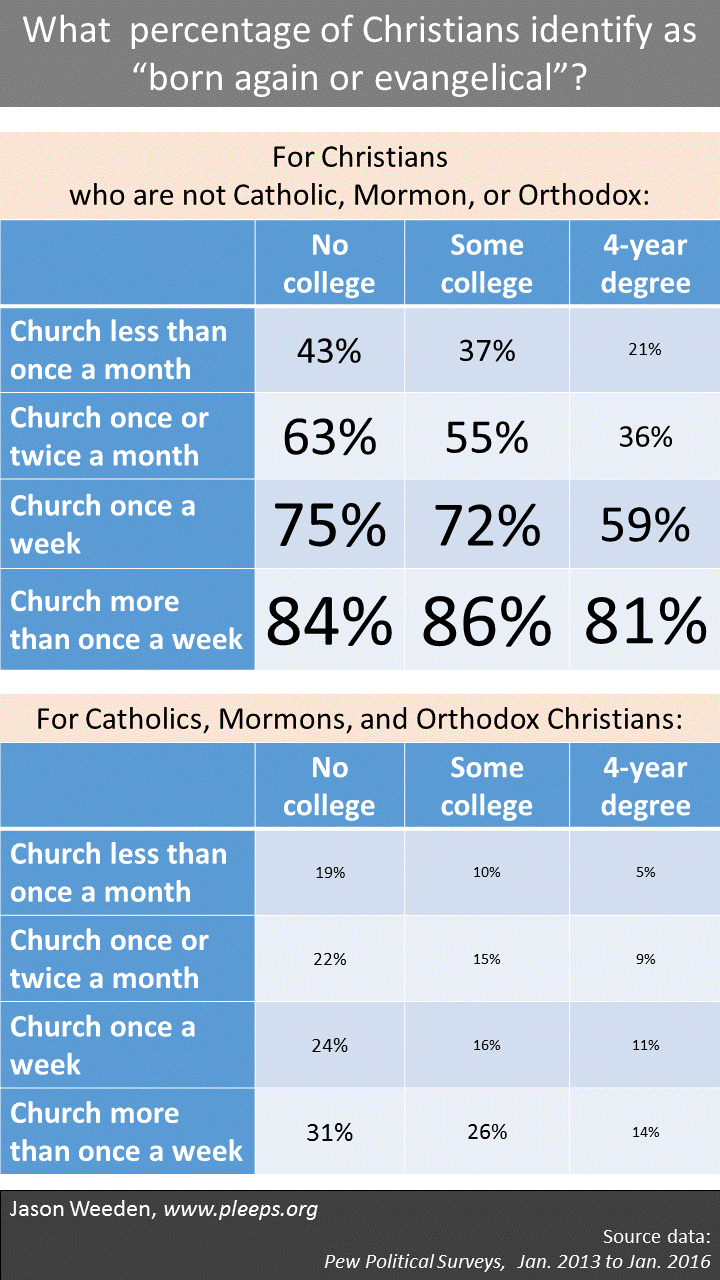Currently, religious identities are among the most potent predictors of political views. This is particularly true for issues with explicit religious content (e.g., school prayer) and for sexual and reproductive issues (e.g., abortion), but has recently become increasingly true as well across the full spectrum of partisan issues—the environment, immigration, race, income redistribution, and so on.
Often the key contrast is between non-Christians on the left and born-again/evangelical Christians on the right. This split interacts to varying degrees with race and education such that the far right is often inhabited by white evangelicals and the far left by college-educated non-Christians.
When thinking about the “born again or evangelical” distinction within Christians, it’s important to understand the basics of when Christians tend to use those labels and when they don’t. In particular, self-identified born-again/evangelical Christians are much more likely to be found among Protestants and generically identified Christians than among Catholics, Mormons, and Orthodox Christians, and also much more common among frequent churchgoers and the less educated. The tables below give the basic numbers.
 (Technical note: The total sample here consists of 42,291 Christians.)
(Technical note: The total sample here consists of 42,291 Christians.)
So, for Protestants and generic Christians who go to church more than once a week, over 80% identify as born-again/evangelical. Move away from these super-attenders, and the numbers vary greatly by education. Among those who go to church less than once a month, for example, 43% of those who haven’t gone to college identify as born-again/evangelical, compared with only 21% of those with 4-year degrees.
Among Catholics, Mormons, and Orthodox Christians, relatively few identify as born-again/evangelical, though it still varies greatly by church attendance and education. Very frequent churchgoers with no college attendance? 31%. Infrequent churchgoers with 4-year degrees? 5%.
Thus, a major part of the potency of the “born again or evangelical” designation as a political predictor is that it lumps together a lot of salient political information—on religious denomination, on frequency of church attendance, and on education—all in one tidy variable.
I also suspect that its use and nonuse serves, in part, as a kind of social indicator for political views. That is, it’s in part a way of quickly summarizing for others one’s positions on religiously salient issues like abortion and gay marriage, acting as a kind of domain-specific liberal/conservative label. Because of that, I’m sometimes reluctant to use it as a political issue predictor. The possibility that it’s a post hoc label for certain political views makes it less interesting when one is trying to get at the root causes of those political views.
In fact, one can typically use denomination and church attendance and education as a longer road to more-or-less the same predictive outcome as the “born again or evangelical” designation. Using “born again or evangelical” as a predictive variable is probably not a real problem, though, so long as one is cognizant of its wider demographic significance. See “evangelical”; think “mostly Protestants and generic Christians with high church attendance and/or less education.”
